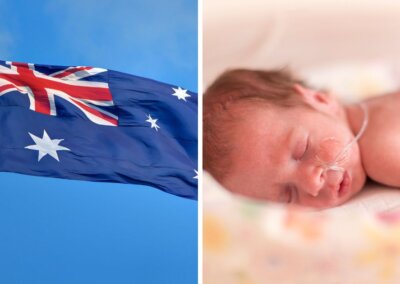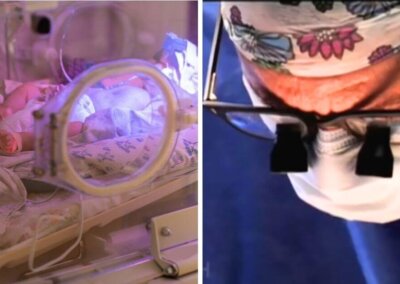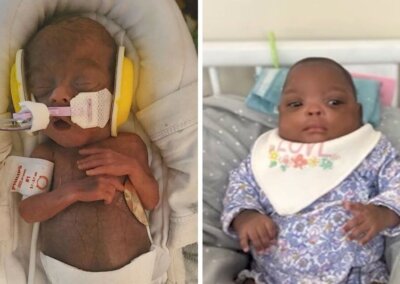A premature baby born 15 weeks early and weighing only 730g has overcome countless setbacks and made it home for Christmas.
Freya-Rose, daughter to Kimberley Melvin, and her partner James Gallacher, was born on 16 July and weighed as little as a bag of crisps.
Classed as an ‘extremely preterm’ baby, Freya-Rose was given a 30% chance of survival, but despite the odds, and after 4 months visiting her in hospital, Kimberley and James have been able to take her home in what they have described as “the best Christmas present”.
Diagnoses and setbacks
Kimberley and James didn’t initially think they’d be able to have children due to Kimberley having polycystic ovary syndrome (PCOS). Nevertheless, after visiting the hospital for treatment to a cyst, Kimberely was told she was 4 weeks into her pregnancy.
“I went for an ultrasound for the purpose of getting a cyst removed and I discovered there was a baby in there – four weeks into the pregnancy”, she said.
“We were overjoyed by the news”.
However, things took a turn for the worse when Kimberley began bleeding unexpectedly. Fearing she was having a miscarriage, she was rushed to Royal Alexandra Hospital in Paisley, underwent tests and was immediately transferred to the Princess Royal Maternity Hospital in Glasgow.
After a two-hour labour she delivered a tiny baby girl.
Kimberley described the proceeding months as “four months in hospital and a lot of setbacks”, as Freya-Rose received a series of diagnoses.
“We were going every day to see her, it’s not been easy, especially leaving the hospital. It’s horrible”.
Kimberley and James were ready to welcome their daughter into their home when the hardship only got worse, and Freya-Rose became ill with sepsis and Streptococcus. This turn of events led to her needing to be revived a few times after she stopped breathing.
The best Christmas present ever
Despite the setbacks, Freya-Rose fought and survived and is now at home with her parents, ready for her first Christmas.
Kimberley, who brought Freya home last month, said: “She’s just like a newborn baby. It was the best Christmas present when she came home”.
Speaking of his gratitude to the staff, James said: “The doctors and nurses were outstanding. They save a life and then they crack on like it’s nothing. To us, they’ve saved our wean’s life”.
“There’s no recognition and they do need to have enough equipment in there. The NHS should be better funded, especially neonatal units”.
“It’s inspiring, we were in there for more than 125 days, it’s a long time to be stuck in there full time. It’s been a long, long journey“.
Born before the abortion limit
Stories like Freya-Rose’s are becoming more and more commonplace in our country.
Last month, Curtis, a baby born at 21 weeks and one day, almost 3 weeks before the abortion limit in the UK, was confirmed to be the world’s most premature baby. In October last year, another severely premature baby, Sofia, was born in Scotland almost 2 weeks below the abortion limit.
Babies like Freya-Rose, Curtis and Sofia are not alone in being born so prematurely and going on to survive. A study published in the Journal of the American Medical Association in October 2019, followed 2.56 million babies born in Sweden between 1973 and 1997, around six percent of whom were born prematurely.
Researchers compared the health data of the premature babies to those that had been born at full term. They found that 55% of premature babies had no serious chronic, physical, or mental health issues by early adulthood. This is compared to 63% for babies born at full term.
Additionally, with each passing decade, the odds of survival for a premature baby to adulthood have improved from about 91% of babies born in the 1970s to about 96% of those born in the 1990s.
Right To Life UK spokesperson, Catherine Robinson, said: “Stories such as this are always a huge encouragement and a reminder of all the great things we can accomplish thanks to modern medicine and the work done by our NHS”.
“It is however tragic to think that while babies like Freya-Rose are being saved in one room of a hospital, another baby’s life could be cruelly ended just down the corridor. Stories such as these demonstrate that these babies can survive, and are the reason why the British Association of Perinatal Medicine allow doctors to intervene to save premature babies from 22 weeks”.
“Is it not about time our abortion law caught up, and we lower our extreme 24-week limit?”












